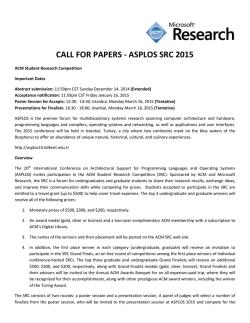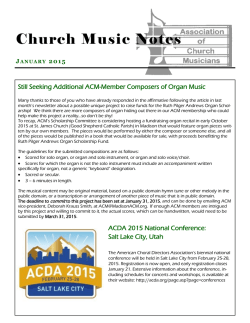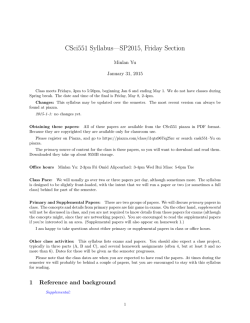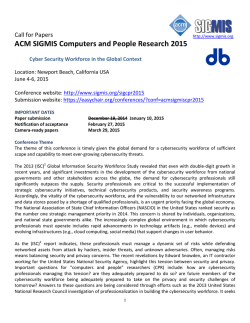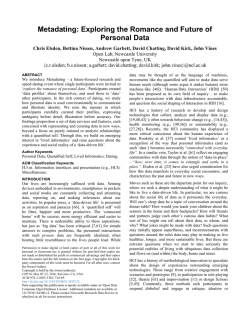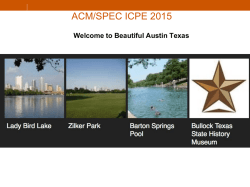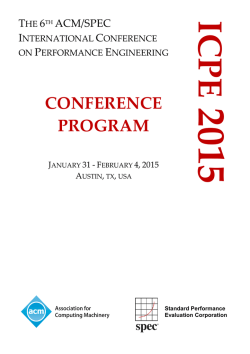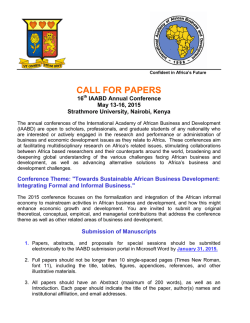
Download my CV.
Laura A. Dabbish Associate Professor of Information Technology & Organizations Director, Connected Experience Lab Human-Computer Interaction Institute, School of Computer Science Joint appt in H. John Heinz III College of Public Policy, Information Systems & Management Carnegie Mellon University 5000 Forbes Ave., Pittsburgh, PA 15213 http://lauradabbish.com [email protected] RESEARCH INTERESTS Human-computer interaction (HCI); human-centered computing (HCC); computer-supported cooperative work (CSCW); social computing; computer-mediated communication (CMC) Current project topics: 1. Open collaboration and new forms of work 2. Psychological impact of computer-mediated communication 3. Social aspects of anonymity, privacy, and security EDUCATION Ph.D. Human-Computer Interaction, 2007 Carnegie Mellon University Dissertation Title: Coordinating Initiation & Response in Computer-Mediated Communication Primary Advisor: Prof. Robert E. Kraut Thesis Committee: Prof. Sara Kiesler, Prof. Scott Hudson, and Prof. Denise Rousseau M.S. Human-Computer Interaction, 2005 Carnegie Mellon University Bachelor of Science, Computer Science (Minor: Psychology), 2000 University of Southern California RESEARCH SUPPORT Deployment-Driven Evaluation and Evolution of the eXpressive Internet Architecture (PI Peter Steenkiste) National Science Foundation, Future Internet Architectures – Next Phase, CNS Division. Award Amount: $2,001,035. Award Period: 5/1/2014 – 4/30/2016 EAGER: Social Cybersecurity: Applying Social Psychology to Improve Cybersecurity (PI Jason Hong), National Science Foundation, Secure and Trustworthy Cyberspace Program, TWS & SBES. Award Amount: $216,000. Award Period: 9/1/2013 – 8/31/2015 Designing Transparent Work Environments (co-PI James Herbsleb), National Science Foundation, Virtual Organizations as Sociotechnical Systems (VOSS) Program. Award Amount: $300,000. Award Period: 8/1/2013 – 7/31/2016 Deep Structures of Collaboration (co-PI Scott Hudson), National Science Foundation, Computing Research Infrastructure Program, CNS Division. Award Amount: $516,000. Award Period: 7/1/2012 – 6/30/2015 Anonymity in Cyberspace (PI Sara Kiesler), National Science Foundation, Secure and Trustworthy Cyberspace Program, TWS & SBES. Award Amount: $514,097. Award Period: 10/1/2012 – 9/31/2015 Development Environments and Social Media: What Drives Success? (co-PI Jim Herbsleb), Heinz College – Center for the Future of Work. Award Amount: $98,000. Award Period: 1/1/2012 – 12/31/2012 Social Transparency and Knowledge Flows in Future Collaborative Work (co-PI Sara Kiesler), Heinz College – Center for the Future of Work. Award Amount: $98,000. Award Period: 1/1/2012 – 12/31/2012 Large-Scale Human-Centered Coordination Systems to Support Interdependent Tasks in Context (PI- Jim Herbsleb, co-PIs André van der Hoek, David Redmiles, Anita Sarma, Linda Argote), National Science Foundation, Human-Centered Computing Large Program, IIS Division of CISE. Award Amount: $1,453,309. Award Period: 9/1/2011 – 8/31/2014 Software 2.0: Social Computing in Software Development (co-PI Jim Herbsleb), Heinz College – Center for the Future of Work. Award Amount: $98,000. Award Period: 1/1/2011 – 12/31/2011 Building Social Attachment in Virtual Teams (PI), (co-PIs Robert Kraut & Tom Postmes), National Science Foundation, Virtual Organizations as Sociotechnical Systems (VOSS) Program. Award Amount: $399, 656. Award Period: 12/1/2009 – 11/30/2012 Social Cohesion in Virtual Teams (PI), Berkman Foundation, Faculty Development Grant. Award Amount: $3000. Award Period: 6/1/2008 – 5/30/2009 Communication, Coordination, & Knowledge Management in Globally Distributed Teams (PI), IBM Corporation, Faculty Fellowship. Award Amount: $40,000. Award Period: 1/1/2008 – 12/31/2008 Laura Dabbish – Curriculum Vita 2 JOURNAL PUBLICATIONS 1. Marlow, J., & Dabbish, L. (2014) “When is a picture not worth a thousand words? The psychological effects of mediated exposure to a remote location.” Computers in Human Behavior, 30, 824-831. 2. Dabbish, L., Stuart, C., Tsay, J., & Herbsleb, J. (2013) “Leveraging Transparency.” IEEE Software, 30(1), pp. 37-43. 3. Dabbish, L., Towne, B., Diesner, J., & Herbsleb, J. (2011) “Construction of Association Networks from Communication in Teams Working on Complex Tasks.” Statistical Analysis and Data Mining, 4(5), pp. 547-563. 4. Goodman, P. & Dabbish, L. (2011) “Methodological Issues in Measuring Group Learning.” Small Group Research, 42(4), pp. 379-404. 5. von Ahn, L. & Dabbish, L. (2008) “General Techniques for Designing Games with a Purpose.” Communications of the ACM, 51(8), pp. 58-67. 6. Dabbish, L. & Kraut, R.E. (2008) “Awareness Displays and Social Motivation for Coordinating Communication." Information Systems Research, 19(2), pp. 221-238. REFEREED CONFERENCE PROCEEDINGS 1. Kyung Lee, M., Kusbit, D., Metsky, E., & Dabbish, L. (2015). Working with Machines: The Impact of Algorithmic and Data-Driven Management on Human Workers. To appear, ACM Conference on Human Factors in Computing Systems (CHI 2015). (Acceptance rate: 23%) 2. Marlow, J., Dabbish, L., & Forlizzi, J. (2015). Exploring the Role of Activity Trace Design on Evaluations of Online Worker Quality. To appear, ACM Conference on Human Factors in Computing Systems (CHI 2015). (Acceptance rate: 23%) 3. Das, S., Kramer, A., Dabbish, L., & Hong, J. (2015). The Role of Social Influence in Security Feature Adoption. To appear, ACM Conference on Computer-Supported Cooperative Work (CSCW 2015). (Acceptance rate: 28%) 4. Marlow, J., & Dabbish, L. (2015). The Effects of Visualizing Activity History on Attitudes and Behaviors in a Peer Production Context. To appear, ACM Conference on ComputerSupported Cooperative Work (CSCW 2015). (Acceptance rate: 28%) 5. Nguyen, D., Dabbish, L., & Kiesler, S. (2015). The Perverse Effects of Social Transparency on Online Advice Taking. To appear, ACM Conference on Computer-Supported Cooperative Work (CSCW 2015). (Acceptance rate: 28%) 6. Kyung Lee, M., Fruchter, N., & Dabbish, L. (2015). Making Decisions From a Distance: The Impact of Technological Mediation on Riskiness and Dehumanization. To appear, ACM Conference on Computer-Supported Cooperative Work (CSCW 2015). (Acceptance rate: 28%) 7. Tsay, J., Dabbish, L., & Herbsleb, J. (2014). Let's Talk About It: Evaluating Contributions Through Discussion in GitHub. In Proceedings of the ACM International Symposium on Foundations of Software Engineering (FSE), Hong Kong. (Acceptance rate: 22%) 8. Das, S., Kim, H.J., Dabbish, L., & Hong, J. (2014). The Effect of Social Influence on Security Sensitivity, Symposium on Usable Privacy and Security (SOUPS 2014). (Acceptance rate: 27%) 9. Kang, R., Brown, S., Dabbish, L., & Kiesler, S. (2014). Privacy Attitudes of Mechanical Turk Laura Dabbish – Curriculum Vita 3 Workers and the U.S. public. Symposium on Usable Privacy and Security (SOUPS 2014). (Acceptance rate: 27%) 10. Marlow, J. & Dabbish L. (2014). Who’s the boss?: Requester transparency and motivation in a microtask marketplace. In Extended Abstracts of ACM Conference on Human Factors in Computing Systems (CHI 2014). 11. Tsay, J., Dabbish, L., & Herbsleb, J. (2014). Influence of Social and Technical Factors for Evaluating Contribution in GitHub. In Proceedings of the International Conference on Software Engineering (ICSE 2014). (Acceptance rate: 20%) 12. Marlow, J. & Dabbish, L. (2014). From Rookie to All-Star: Professional development in a graphic design social networking site. In Proceedings of the ACM Conference on Computer Supported Cooperative Work (CSCW 2014), pp 922-933. New York: ACM Press. (Acceptance rate: 27%) 13. Tausczik, Y., Dabbish, L., Kraut, R. (2014). Building loyalty to online communities through bond and identity-based attachment to sub-groups. In Proceedings of the ACM Conference on Computer Supported Cooperative Work (CSCW 2014), pp 146-157. New York: ACM Press. (Acceptance rate: 27%) 14. Kinnaird, P., Dabbish, L., Kiesler, S., & Faste, H. (2013). Co-worker transparency in a microtask marketplace. In Proceedings of the ACM Conference on Computer-Supported Cooperative Work (CSCW 2013), pp. 1285-1290. New York: ACM Press. (Acceptance rate: 36%). 15. Marlow, J., & Dabbish, L. (2013). Activity traces and signals in software developer recruitment and hiring. In Proceedings of the ACM Conference on Computer-Supported Cooperative Work (CSCW 2013), pp. 145-156. New York: ACM Press. (Acceptance rate: 36%). 16. Marlow, J., Dabbish, L., & Herbsleb, J. (2013). Impression formation in online peer production: activity traces and personal profiles in GitHub. In Proceedings of the ACM Conference on Computer-Supported Cooperative Work (CSCW 2013), pp. 117-128. New York: ACM Press. (Acceptance rate: 36%). 17. Kinnaird, P., Dabbish, L., & Kiesler, S. (2012). Workflow transparency in a microtask marketplace. To appear In Proceedings of the ACM International Conference on Supporting Group Work (GROUP 2012), pp. 281-284. New York: ACM Press. (Acceptance rate: ~30%). 18. Dabbish, L., Kraut, R., & Patton, J. (2012). Communication and commitment in an online game team. In Proceedings of the ACM Conference on Human Factors in Computing Systems (CHI 2012), pp. 879-888. New York: ACM Press. (Acceptance rate: 23%). 19. Dabbish, L., Stuart, C., Tsay, J., & Herbsleb, J. (2012). Social coding in GitHub: Transparency and collaboration in an open software repository. In Proceedings of the ACM Conference on Computer-Support Cooperative Work (CSCW 2012). pp. 1277-1286. New York: ACM Press. (Accepted in first round of review, acceptance rate: 9%). 20. Stuart, C., Dabbish, L., Kiesler, S., Kinnaird, P., & Kang, R. (2012). Social transparency in networked information exchange: A theoretical framework. In Proceedings of the ACM Conference on Computer-Support Cooperative Work (CSCW 2012). pp. 451-460. New York: ACM Press. (Accepted in second round of review, acceptance rate: 39.5%). 21. Dabbish, L., Farzan, R., Kraut, R., & Postmes, T. (2012). Fresh faces in the crowd: Turnover, identity, and commitment in online groups. In Proceedings of the ACM Conference on ComputerSupport Cooperative Work (CSCW 2012), pp. 245-248. New York: ACM Press. (Best note award winner: 1% of submissions, Accepted in first round of review, acceptance rate: 9%) 22. Wiese, J., Kelley, P.G., Cranor, L.F., Dabbish, L., Hong, J.I., & Zimmerman, J. (2011). Are you close with me? Are you nearby? Investigating social groups, closeness, and willingness to share. In proceedings of the ACM conference on Ubiquitous computing (UbiComp 2011). pp. 197-206. New York: ACM Press. (Acceptance rate: 16.6%) Laura Dabbish – Curriculum Vita 4 23. Dabbish, L., Mark, G., & Gonzáles, V. (2011). Why do I keep interrupting myself?: Selfinterruption, habit, and environment. In Proceedings of the ACM Conference on Human Factors in Computing Systems (CHI 2011), pp. 3127-3130. New York: ACM Press. (Acceptance rate: 27%) 24. Wainer, J., Dabbish, L., & Kraut, R. (2011). Should I open this email?: Curiosity and attention to email messages. In Proceedings of the ACM Conference on Human Factors in Computing Systems (CHI 2011), pp. 3439-3448. New York: ACM Press. (Acceptance rate: 27%) 25. Farzan, R., Dabbish, L., Kraut, R., & Postmes, T. (2011). Increasing commitment to online communities by designing for social presence. In Proceedings of the ACM Conference on Computer Supported Cooperative Work (CSCW 2011), pp. 321-330. New York: ACM Press. (Acceptance rate: 22%) 26. Marlow, J., & Dabbish, L. (2011). Photo sharing in diverse distributed teams. In Proceedings of the ACM Conference on Computer-Supported Cooperative Work (CSCW 2011), pp. 317-321. New York: ACM Press. (Acceptance rate: 22%) 27. Dabbish, L., Wagstrom, P., Sarma, A., & Herbsleb, J. (2010). Coordination in Innovative Design and Engineering: Observations from a Lunar Robotics Project. In Proceedings of the ACM Conference on Supporting Group Work (GROUP 2010), pp. 225-234. New York: ACM Press. (Acceptance rate: 36%) 28. Jin, J., & Dabbish, L. (2009). Self-interruption on the computer: A typology of discretionary task interleaving. In Proceedings of the ACM Conference on Human Factors in Computing Systems (CHI 2009), pp. 1799-1808. New York: ACM Press. (Acceptance rate: 25%) 29. Dabbish, L. (2008). Jumpstarting relationships with online games: Evidence from a laboratory experiment. In Proceedings of the ACM Conference on Computer-Supported Cooperative Work (CSCW 2008), pp. 353-356. New York: ACM Press. (Acceptance rate: 23%) 30. Dabbish, L., Hsieh, G., Kraut, R.E., & Hudson, S. (2007) “Prioritizing Computer-Mediated Communication: Identity, Urgency and Value. In Best Paper Proceedings of the Academy of Management Annual Meeting. (Acceptance rate: 10%) 31. Dabbish, L., & Kraut, R.E. (2006). Email overload at work: An analysis of factors associated with email strain. In Proceedings of the ACM Conference on Computer-Supported Cooperative Work (CSCW 2006), pp. 182-191. New York: ACM Press. (Acceptance rate: 22%) 32. Dabbish, L., Kraut, R.E., Fussell, S., & Kiesler, S. (2005). Understanding email use: Predicting action on a message. In Proceedings of the ACM Conference on Human Factors in Computing Systems (CHI 2005), pp. 691-700. New York: ACM Press. (Acceptance rate: 25%) 33. Dabbish, L. (2005). Evaluating technology for coordinating communication. In Extended Abstracts of the ACM Conference on Human Factors in Computing Systems (CHI 2005), pp. 1112-1113. New York: ACM Press. (Acceptance rate: unknown) 34. Dabbish, L., & Kraut, R.E. (2004). Controlling Interruptions: Awareness Displays and Social Motivation for Coordination. In Proceedings of the ACM Conference on Computer Supported Cooperative Work (CSCW), pp. 182-191. New York: ACM Press. (Acceptance rate: 30%) 35. von Ahn, L., & Dabbish, L. (2004). Labeling Images with a Computer Game. In Proceedings of the ACM Conference on Human Factors in Computing Systems (CHI 2004), pp. 319-326. New York: ACM Press. (Acceptance rate: 16%) 36. Dabbish, L., & Kraut, R.E. (2003). Coordinating Communication: Awareness Displays and Interruption. In Extended Abstracts of the ACM Conference on Human Factors in Computing Systems (CHI 2003), pp. 786-787. New York: ACM Press. (Acceptance Rate: 16%) 37. Dabbish, L., & Baker, R. (2003). Administrative Assistants as Interruption Mediators. In Extended Abstracts of the ACM Conference on Human Factors in Computing Systems (CHI 2003), pp. Laura Dabbish – Curriculum Vita 5 1020-1021. New York: ACM Press. (Acceptance Rate: unknown) 38. Dabbish, L., Venolia, G., & Cadiz, J.J. (2003). Marked for deletion: An analysis of email data. In Extended Abstracts of the ACM Conference on Human Factors in Computing Systems (CHI 2003), pp. 924-925. New York: ACM Press. (Acceptance Rate: unknown) 39. Myers, B., Casares, J., Stevens, S., Dabbish, L., Yocum, D., & Corbett, A., (2001). A MultiView Intelligent Editor for Digital Video Libraries. In Proceedings of the Joint Conference on Digital Libraries (JCDL 2001), pp. 106-115. New York: ACM Press. (Acceptance rate: 30%) 40. Fogarty, J., Dabbish, L., Steck, D., & Mostow, J. (2001). Mining a Database of Reading Mistakes: For What Should an Automated Reading Tutor LISTEN? In J.D. Moore, C.L. Redfield, and W.L. Johnson (Eds.), Artificial Intelligence in Education: AI-ED in the Wired and Wireless Future (pp. 422-433). Amsterdam, the Netherlands: IOS Press. (Acceptance Rate: 45%) ADDITIONAL PUBLICATIONS 41. Marlow, J., & Dabbish, L. (2013). Designing to Improve Interpersonal Impression Accuracy in Online Peer Production. In Proceedings of the ACM Conference on Human Factors in Computing Systems (CHI 2013). New York: ACM Press. (Interactive Poster). 42. Marlow, J. & Dabbish, L. (2012). Designing interventions to reduce psychological distance in globally distributed teams. In Proceedings of the ACM Conference on Computer-Supported Cooperative Work Companion (CSCW 2012), pp. 163-166. New York: ACM Press. (Interactive Poster) 43. Tsay, J., Dabbish, L., & Herbsleb, J. (2012). Social media and success in open source projects. In Proceedings of the ACM Conference on Computer-Supported Cooperative Work Companion (CSCW 2012), pp. 223-226. New York: ACM Press. (Interactive Poster) 44. Won, S.S., & Dabbish, L. (2009). Designing for email response management. In Extended Abstracts of the ACM Conference on Human Factors in Computing Systems (CHI 2009), pp. 3661-3666. New York: ACM Press. (Interactive Poster) 45. Dabbish, L., & Baker, R. (2003). Administrative Assistants as Interruption Mediators. In Extended Abstracts of the ACM Conference on Human Factors in Computing Systems (CHI 2003), pp. 1020-1021. New York: ACM Press. (Interactive Poster) 46. Dabbish, L., Venolia, G., & Cadiz, J.J. (2003). Marked for deletion: An analysis of email data. In Extended Abstracts of the ACM Conference on Human Factors in Computing Systems (CHI 2003), pp. 924-925. New York: ACM Press. (Interactive Poster) TECHNICAL REPORTS 47. Dabbish, L. (2006). Coordinating initiation and response in computer-mediated communication. Carnegie Mellon University Technical Report: CMU-HCII-06-108. 48. Venolia, G., Dabbish, L., Cadiz, J.J., & Gupta, A. (2001). Supporting email workflow. Microsoft Research Technical Report: MSR-TR-2001-88. Laura Dabbish – Curriculum Vita 6 PAPERS IN PREPARATION 49. Dabbish, L., Stuart, C., Tsay, J., & Herbsleb, J. “Coordination in Open Collaboration Communities.” In preparation for submission to Organization Science. 50. Dabbish, L., Farzan, R., Kraut, R., & Postmes, T. “Designing for Attachment in Online Groups.” In preparation for submission to the HCI Journal. 51. Dabbish, L., & Kraut, R. “Communication and Commitment to Temporary Virtual Teams.” In Preparation for submission to the Journal of Applied Psychology. 52. Daniel, S., Diamant, I., Dabbish, L. & Collier, B. "The Role of Users in FLOSS Project Performance: Cross Project Participation, Interactivity, and OSS Project Performance." under preparation for submission to ISR. 53. Dabbish, L., Hsieh, G., Kraut, R., & Hudson, S. “Prioritization in Computer-Mediated Communication.” In Preparation for submission to the HCI Journal. 54. Hiruncharoenvate, C., Dabbish, L., & Farzan, R. “Look who’s not talking: Chat seeding, persistence and commitment in online groups,” In Preparation for submission to CHI conference. 55. Tsay, J., Dabbish, L., & Herbsleb, J. “Project Vibrancy in Transparent Work Environments,” In preparation for submission to TSE Journal. WORKSHOP AND CONFERENCE PRESENTATIONS 56. “Asynchronous Knowledge Sharing: Coordination in a Transparent Work Environment,” with Colleen Stuart, Jason Tsay and Jim Herbsleb, Interdisciplinary Network of Group Researchers (InGROUP 2013), July 2013. 57. “Persistent Collaborators in Online Production Communities,” with Colleen Stuart, Jason Tsay and Jim Herbsleb, Interdisciplinary Network of Group Researchers (InGROUP 2013), July 2013. 58. “Social Media in Transparent Work Environments,” with Jason Tsay, and Jim Herbsleb, 6th International Workshop on Cooperative and Human Aspects of Software Engineering (CHASE 2013), May 2013. 59. “Social Computing, Collaboration and Learning in an Open Source Software Development,” with Colleen Stuart, Jason Tsay and Jim Herbsleb, Human-Computer Interaction Consortium Workshop (HCIC 2012), June 2012. 60. “Coding for an Audience: Transparency and Collaborative Behavior in a Social Coding Environment,” with Colleen Stuart, Jason Tsay and Jim Herbsleb, Future of Collaborative Software Development Workshop at CSCW 2012, Feb 2012. 61. “Transparency and Organizational Learning,” with Colleen Stuart, Jason Tsay and Jim Herbsleb, Organization Science Winter Conference, Feb 2012. 62. “Commitment and Communication,” with Robert Kraut and Jordan Patton, Interdisciplinary Network of Group Researchers (InGROUP 2011), July 2011. 63. “Social Networking Platforms as Collaborative Infrastructure,” COASTE, July 2011. 64. “Reducing Psychological Distance in Distributed Teams,” with Jennifer Marlow, CHI 2011 Workshop: Transnational HCI: Humans, Computers and Interactions in Transnational Context, May 2011. Laura Dabbish – Curriculum Vita 7 65. “SeeMail: Visualizing Email Response,” with Zachary Wise, CHI 2011 Workshop: Personal Informatics & HCI: Design, Theory, & Social Implications, May 2011. 66. “Examining the Impact of Visual Group Displays on Social Attachment in Virtual Teams,” with Jennifer Marlow, Interdisciplinary Network of Group Researchers (InGROUP 2010), July 2010. 67. “Portraying Online Groups: The Influence of Visual Display Parameters on Group Perceptions,” with Jennifer Marlow, Academy of Management Annual Meeting (AOM 2010), August 2010. 68. “Supporting Coordination of Interdependent Work: A Constraint Network Representation,” with Jim Herbsleb, Anita Sarma, and Patrick Wagstrom, Academy of Management Annual Meeting (AOM 2009), August 2009. 69. “A Network Representation of Dependencies in Engineering,” with Jim Herbsleb, Anita Sarma, and Patrick Wagstrom, Interdisciplinary Network of Group Researchers (InGROUP 2009), July 2009. 70. “Supporting Coordination of Interdependent Work,” with Jim Herbsleb, Anita Sarma, and Patrick Wagstrom, Human-Computer Interaction Consortium (HCIC 2009), February 2009. 71. “Understanding the Collaboration Needs of a Distributed Team,” with Patrick Wagstrom, Anita Sarma, and Jim Herbsleb, CSCW 2008 Workshop: Supporting Distributed Team Work, November 2008. 72. “Theory and Analysis of Closely-Coupled Production Work,” with Jim Herbsleb, Patrick Wagstrom, and Anita Sarma, CSCW 2008 Workshop: Supporting Distributed Team Work, November 2008. 73. “Methodological Issues in Substantiating Group Learning,” with Paul Goodman, Interdisciplinary Network of Group Researchers (INGROUP 2008), July 2008. 74. “Towards a Science of Social Design,” GROUP 2007 Workshop: Research Directions for Social computing, November 2007. 75. “A Model of Communication Initiation and Response,” Academy of Management, OCIS Division, Doctoral Consortium, August 2005. 76. “Awareness Displays and Social Motivation for Coordinating Communication,” with Robert Kraut, CHI 2005 Workshop: Awareness Systems: Known results, theory, concepts and future challenges, April 2005. 77. "Interruption Timing, Performance, and Negative Affect," with Sharon Tan, ACM Conference on Computer Supported Cooperative Work (CSCW), November 2004. 78. "Awareness Displays and Interruptions in Teams," with Robert Kraut, Academy of Management Paper Presentation, August 2003. 79. “Coordinating Communication: Awareness Displays and Interruption,” with Robert Kraut, CHI 2003 Workshop: Providing Elegant Peripheral Awareness, April 2003. TEACHING Associate Professor, Carnegie Mellon University, Heinz & HCII 2012 – Present Currently teaching courses on Human Factors and Social Perspectives in HCI for the HCI Institute and Organizational Design and Implementation and Managing in a Virtual Environment in the Heinz College. Typical enrollment is 50 - 80 students per semester. Laura Dabbish – Curriculum Vita 8 Assistant Professor, Carnegie Mellon University, Heinz & HCII 2007 – 2012 Taught courses on Human Factors and Computer-Mediated Communication for the HCI Institute and Managing in a Virtual Environment and Organizational Design and Implementation in the Heinz College. Typical enrollment is 50 - 80 students per semester. Instructor, Carnegie Mellon University, SDS Organizations, Fall 2004 With Prof. Toby Davis. 70 student enrollment, organizational behavior and organization theory curriculum. Teaching evaluation score of 4.2 out of 5, above the CMU average teaching score. WORK EXPERIENCE Research Intern, Microsoft Research 2001 Collaboration & Multimedia Systems Group Performed a set interviews with Microsoft employee's regarding their Email usage behaviors, to inform the development of a prototype Email client to facilitate navigation of groups of reply threads, and assisted on a user study evaluating the usefulness of viewing messages by threads. Undergraduate Research Assistant, University of Southern California 1999-2000 Integrated Media Systems Center Performed background research in facial expression and facial animation and tracking. Worked to validate conveyed expression of 3-D facial avatars. Also worked on project to recognize known facial expressions through facial tracking. Software Engineering Intern, Motorola Inc. 1997-1999 Land Mobile Products Sector, 1999 Performed information acquisition in the form of market research, software documentation, and iDEN system packet data network analysis for software/hardware demonstration of new products. Cellular Infrastructure Group, 1998 Investigated, coded and tested to remedy abnormal behavior in the cellular software system. Performed and documented testing on the Central Base Site Controller to Base Site interface. Cellular Infrastructure Group, 1997 Developed tools necessary to capture existing CDMA load and system operations documentation and procedures and make it available on the internet to improve field engineer productivity. HONORS AND AWARDS Best Paper ACM Conference on Computer-Supported Cooperative Work 2012 IBM Faculty Fellowship – Services Science Division 2008 CMU Berkman Faculty Development Grant 2008 NSF Summer Research Institute on the Science of Socio-Technical Systems 2008 Academy of Management, OCIS Junior Faculty Consortium 2007 Laura Dabbish – Curriculum Vita 9 Academy of Management, OCIS Doctoral Consortium 2005 ACM SIGCHI Conference, Doctoral Consortium 2005 National Defense Science and Engineering Graduate Research Fellowship 2001-2004 University of Southern California Full-Tuition Trustee Fellowship 1996-2000 University of Southern California Merit Research Award 1996-2000 EDP Award for Outstanding Computer Science Student of the Year 2000 Recipient, National Merit Corporate Scholarship, Motorola Inc. 1996-2000 University of Southern California Dean’s List 1996-2000 National honor societies: Alpha Lambda Delta, Golden Key, Tau Beta Pi, Upsilon Pi Epsilon PROFESSIONAL AND COMMUNITY SERVICE Workshop Chair, ACM CSCW Conference 2015 Consortium for the Science of Sociotechnical Systems (CSST) Advisory Board 2014 – 2015 Organizer, CMU HCII Social Computing Summer REU Program 2013 – 2014 Subcommittee Chair, ACM CHI Conference 2011 – 2014 Senior Associate Chair, ICWSM Conference 2013 Program Committee Chair, HCIC 2012 Workshop 2012 Associate Chair, ACM GROUP Conference 2012 Associate Editor, International Conference on Information Systems (ICIS) 2011 – 2012 Ad hoc Reviewer, MIS Quarterly Journal 2011 Organizing Committee, ACM CSCW Conference 2010 – 2011 Ad hoc Reviewer, Transactions on Human-Computer Interaction Journal 2010 – 2011 Ad hoc Reviewer, Human-Computer Interaction Journal 2010 Participant, CCC CRA Workshop on Ultra Large Scale Interaction 2010 Reviewer, NSF Directorate for Social, Behavioral & Economic Sciences (SBE) 2010 Panelist, NSF Directorate for Computer & Information Science & Engineering 2009 – 2011 Program Committee, KDD Workshop on Human Computation (HCOMP) 2009 – 2011 Ad hoc Reviewer, Communications of the ACM (CACM) Journal 2009 Program Committee, ACM CHI Conference 2008 – Present CMU Heinz School Masters of Entertainment Management Steering Committee 2008 – 2009 CMU HCI Institute Open House Planning Committee 2008 CMU HCI Institute PhD Admissions Committee 2008 CMU Heinz School Strategic Planning Committee 2007 – Present CMU Heinz School PhD Committee 2007 – Present Laura Dabbish – Curriculum Vita 10 Workshops Chair, ACM CSCW Conference 2008 Student Volunteer Co-Chair, ACM CSCW Conference 2006 Reviewer, ACM Computer-Supported Cooperative Work Conference 2004 – 2008 Reviewer, ACM CHI Conference 2001 – 2008 Reviewer, ACM International Conference on Supporting Group Work 2005 Reviewer, International Conference on Information Systems (ICIS) 2005 – 2008 Ad hoc Reviewer, ACM Computing Surveys Journal 2005 Ad hoc Reviewer, Organization Science Journal 2004 – Present Reviewer, American Conference on Information Systems (AMCIS) 2004 – 2005 Student Volunteer, ACM CHI Conference 2002 MEMBERSHIP Academy of Management, Organizational Communication and Information Systems (OCIS) Association for Information Systems (AIS) Association for Computing Machinery (ACM) Interdisciplinary Network for Group Research (INGRoup) STUDENTS SUPERVISED PhD Student Advising: Jennifer Marlow, PhD Candidate in the Human-Computer Interaction Institute, School of Computer Science, Carnegie Mellon University Jason Tsay (co-advised with Jim Herbsleb), PhD Candidate in the Institute for Software Research, School of Computer Science, Carnegie Mellon University Tatiana Vlahovic (co-advised with Robert Kraut), PhD Candidate in the Human-Computer Interaction Institute, School of Computer Science, Carnegie Mellon University Undergraduate Senior Thesis Students: Jaclyn Wainer, Tepper School of Business & Psychology, Graduated Spring 2010 Thesis Title: Should I Open this Email? Influences on Attention to a Message Jing Jin, HCI & Computer Science, Graduated Spring 2009 Thesis Title: Understanding Self-Interruption on the Computer PhD Committee Member: Laura Dabbish – Curriculum Vita 11 Ruogu Kang, PhD Candidate, Human-Computer Interaction Institute, Carnegie Mellon University Thesis Title: Incognito Online: Why and How People Hide their Digital Traces Brandi Pearce, PhD Candidate, Heinz College, Carnegie Mellon University Thesis Title: Crossing the Divide: An Examination of Informational and Social Dynamics in Inter-Organizational Groups Bo Rem Choi, Tepper School of Business, Carnegie Mellon University, PhD 2012 Thesis Title: Socialization in Online Communities Gary Hsieh, Human-Computer Interaction Institute, Carnegie Mellon University, PhD 2010 School of Computer Science, Carnegie Mellon University Thesis Title: Markets for Information Exchange Karen Tang, Human-Computer Interaction Institute, Carnegie Mellon University, PhD 2010 School of Computer Science, Carnegie Mellon University Thesis Title: Usable Privacy Interaction Techniques for Context-Aware Mobile Social Applications Ting Ting “Klarissa” Chang, Tepper School of Business, Carnegie Mellon University, PhD 2007 Thesis Title: A Psychological Contract Perspective on Social Embeddedness and Knowledge Exchange Independent Study Supervision: Mirae Kim (Spring 2014, “Gaze-based Social Shopping Interaction”) Daniel Kusbit (Spring and Fall 2014, “Working with Algorithms”) Su Bakyal (Spring and Fall 2014, “Working with Algorithms”) Evan Metsky (Spring and Fall 2014, “Working with Algorithms”) Nathaniel Fruchter (Spring and Fall 2014, “Decision Making at a Distance”) Lois Yang (Spring 2014, “Working with Algorithms”) Katherine Stewart (Spring 2014, “Internet Mental Models”) Chaya Hiruncharoenvate (Spring 2011, “Encouraging Communication in Online Communities“) Bowen Low (Fall 2010 and Spring 2011, “Tracking Computer Application Usage”) Karthik Dinakar (Spring 2009, “Attention and Communication Issues in Complex Work”) Sungjoon Steve Won (Fall 2008, “Designing for Email Response Management”) Aleksandra Zats (Spring and Fall 2008, “Studying Communication Decision Making Behavior”) Undergraduate Research Assistants: Sonal Chakrasali, Rebecca Weir, Kate Sutton, Zach Mullins, Stephanie Brown, Divya Kothandapani, Winnie Leung, Lisa Kim, Julie Eckstrom, Dillon Grove, Meng Hu, Zachary Wise, Lauren Geisey, Rohit Kabra, Shusaku Uesugi (Quora), Mark Ritterhoff, Matthew Hockenberry (MIT Media Lab), Megan Branning, Julia Carter, Rachel Wu, David Weitzman, and David Stern. Laura Dabbish – Curriculum Vita 12
© Copyright 2026
